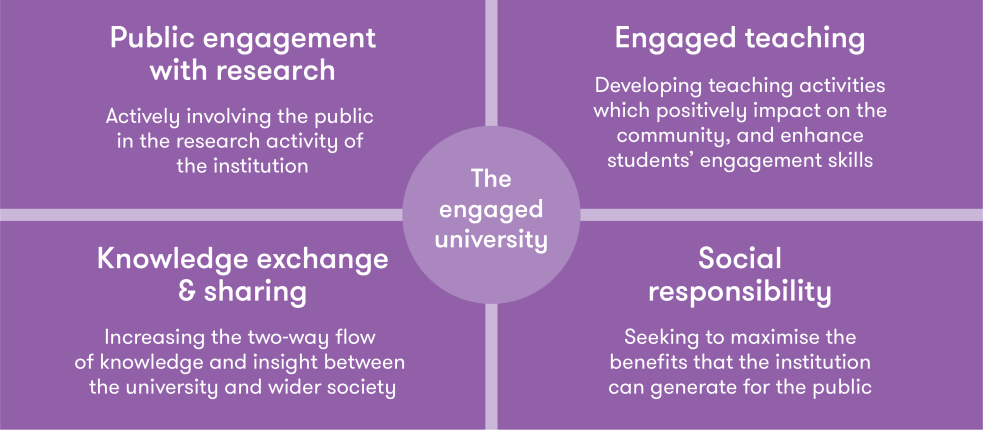Knowledge Exchange Briefing
- The Engaged University
- What is Knowledge Exchange?
- The Knowledge Exchange Concordat
- Introducing the Knowledge Exchange Framework
- Assessing Public and Community Engagement in the KEF
- Categorising approaches to Public & Community Engagement activity in the KEF narratives
- The future of Knowledge Exchange and Public Engagement Policy
This briefing explores how public engagement features in UK Knowledge Exchange policy. It looks in detail at the Knowledge Exchange Concordat (KEC) and the Knowledge Exchange Framework (KEF).
What is Knowledge Exchange?
Knowledge exchange has been a priority for UK higher education funders for many years. It encompasses a wide variety of activities that connect staff and students to external communities. The word ‘exchange’ emphasises that it flows in two directions: it enables university expertise and knowledge to make a difference in the world, and it improves the quality of research and education.
While a distinct area of policy, it overlaps with activities to realise impact from research, with ‘engaged’ teaching (which provides students with opportunities to apply their learning in settings outside the university), and with the increasing focus on civic and place-based activity.
It has remained for many years a carefully targeted priority for each UK government, who have each developed schemes to ‘pump prime’ activity. While often assumed to be focused on interaction with business and on commercialisation, KE policy is increasingly focused on a broad portfolio of social and economic outcomes.
Research England has taken the most explicit interest in funding Public and Community Engagement through its Higher Education Innovation Fund (HEIF). HEIF guidance identifies Public and Community Engagement as one of their 7 priority areas. Many English Universities use their allocation of HEIF funding to invest in public and community engagement.
The Scottish Funding Council’s University Innovation Fund doesn’t explicitly reference public engagement, and is focused currently on responding to employer and industry needs, but their strategy does prioritise the need for Scottish Universities to be connected and collaborative, and to focus on the cultural and economic needs of Scotland, for place and community. In Wales, HEFCW’s Vision for Wales and their Research Wales Innovation Funding identifies public engagement and Civic Mission as important routes to impact.
All UK universities submit data to the Higher Education Business and Community Interaction (HE-BCI) survey. This collects financial and output data related to knowledge exchange each academic year and has been running since 1999. The survey collects data about Social, Community and Cultural Engagement. It is currently under review, and the categories used (public events, such as lectures, performance festivals and exhibitions) are expected to be significantly revised in a re-launched survey to better capture a fuller range of public engagement activities.

Universities and higher education providers have long worked with businesses, the public sector and local communities to deliver real world impacts. However, efforts need to be stepped up to deliver the UK Government’s R&D 2.4% target and tackle challenges such as levelling up prosperity across the country.
The Knowledge Exchange Concordat
The Knowledge Exchange Concordat (KEC) was launched in 2020 and aims to facilitate good practice and capacity-building across England, Scotland, Wales, and Northern Ireland. The Concordat provides the following definition of KE:
Knowledge exchange can be defined as a collaborative, creative endeavour that translates knowledge and research into impact in society and the economy. KE includes a set of activities, processes and skills that enable close collaboration between universities and partner organisations to deliver commercial, environmental, cultural and place-based benefits, opportunities for students and increased prosperity.
It is forward looking, asking institutions to consider how they plan to improve their work in the coming years. The KEC is supported by UUK and a consortia of partners, and is optional for universities across the UK. It identifies 8 principles of good practice which institutions are invited to report against. These echo the focal points in the NCCPE’s EDGE tool. The KE Concordat and the linked action planning process has provided a platform for Public Engagement Professionals to contribute their expertise and ‘position’ public engagement as central to their institution’s wider knowledge exchange activity.
The KE Concordat principles
|
Principle |
Focus |
|
Mission |
Knowledge exchange is a recognised part of the overall institutional strategy |
|
Policies and processes |
A well-defined set of relevant policies ensures that all parties engaged in KE have a good mutual understanding of how the institution values KE activity |
|
Engagement |
We have clear engagement mechanisms and policies developed to suit the needs of a wide range of beneficiaries and partners |
|
Working transparently and ethically |
We are open about the ethical and charitable regulatory environments in which our institution operates |
|
Capacity building |
We ensure that our staff and students are developed and trained appropriately to understand and undertake their roles and responsibilities in the delivery of successful KE. |
|
Recognition and rewards |
We recognise and reward the achievements of staff and students who perform high quality KE activities. |
|
Continuous improvement |
We proactively strive to share best practice with our peers and have established processes for learning from this. |
|
Evaluating success |
We undertake regular institutional and collective monitoring and review of our strengthening KE performance |
Introducing the Knowledge Exchange Framework
The Knowledge Exchange Framework, or KEF for short, is an England-only initiative, and represents the most significant and concerted attempt to embed public engagement within Knowledge Exchange policy. It is run by Research England.
The idea of a Knowledge Exchange Framework (KEF) was first floated in 2017 by the UK government, who wanted more information about how Higher Education Providers (HEPs) were serving the economy and society for the benefit of publics, businesses and communities. The KEF was piloted with a sample of providers during Spring 2019.
The KEF has two main purposes:
- To provide universities with a useful source of information and data on their knowledge exchange (KE) activities, for the purposes of understanding, benchmarking and improving their own performance.
- To provide businesses and other users (and potential users) of university knowledge with another source of information, which may increase visibility of potential university partners and their strengths and contribute to their internal decision-making processes.
The intention was to make the KEF as ‘light touch’ a process as possible for HEIs – and initially the expectation was that this could be achieved by simply harvesting existing data about university engagement activity, to create ‘dashboards’ to allow comparisons with other institutions in similar groupings (or clusters).
This data is organised in seven perspectives – broad domains within which universities typically exchange knowledge with wider society. These seven perspectives are:
- Research partnerships
- Working with business
- Working with the public and third sector
- Skills, enterprise and entrepreneurship
- IP and commercialisation
- Local growth and regeneration
- Public and community engagement
The NCCPE’s interest in the KEF is particularly focused in the last two areas:
- Public and community engagement: The myriad of ways in which the activity and benefits of higher education and research can be shared with the public and communities.
- Local growth and regeneration: Activity where higher education institutions, businesses, public sector and the wider civil society work together to achieve a strategic goal with a prime focus on local growth or regeneration in a self-defined local area.
Assessing Public and Community Engagement in the KEF
Piloting the KEF led to the decision to abandon the use of existing metrics for the Public and Community Engagement perspective, because of a lack of reliable and relevant data. Instead, institutions are invited to complete a self-assessment against five aspects, accompanied by a 2500 word narrative, to provide the context for their work and evidence to support the self-assessment scores. The NCCPE contributed to the development of this approach, drawing heavily on the EDGE tool and our work with universities across the UK.
The five aspects covered in the narrative template:
|
Aspect |
Description |
|
Strategy |
Developing a strategic approach with the needs of relevant publics and communities in mind |
|
Support |
The practical support that is in place to enable effective public and community engagement |
|
Activity |
Activities undertaken to deliver your strategic approach including, where possible, evidence of their effectiveness |
|
Enhancing Practice |
Your approach to evaluating and enhancing the quality of your P&CE activities and practice |
|
Building on Success |
How you monitor the overall effectiveness of your strategic approach and support for P&CE, and how you share and act on the results |
HEIs are invited to self-assess their performance in each aspect using the following framework. Each aspect has detailed guidance that describes what might be expected to be in place for each score.
The self-assessment framework for scoring
|
Score |
Stage of Development |
|
1 or 1.5 |
Emergent, some plans have been put in place |
|
2 or 2.5 |
Planning in place and work is underway. Pockets of good practice across the institution |
|
3 or 3.5 |
Support is in place, underpinning significant areas of good practice |
|
4 or 4.5 |
Well-developed approach, which is appropriately resourced and reflected in work across the institution (e.g. not confined to one faculty/school/centre) |
|
5 |
Fully developed and embedded across the institution to an exemplary level, with a culture of continuous improvement and good evidence on outcomes |
The future of Knowledge Exchange and Public Engagement Policy
The various developments outlined above demonstrate how Public Engagement is playing an increasingly important role in contributing to Knowledge Exchange policy.
Looking ahead, it is interesting to speculate about how this contribution will evolve. A particularly significant finding from the NCCPE’s review of the 2021 KEF narratives was a ‘blurring’ of boundaries between different modes of external engagement (public, community, civic, local growth, regeneration etc). We noted how connecting with publics and communities is now acting as a ‘big idea’ to describe the overarching ambition of many HEIs’ Knowledge Exchange strategies, often linked to a growing focus on place and on their civic role.
The table below identifies ways in which public engagement can help ensure an inclusive and ethical approach is taken across all of the different domains of KE.
|
KEF Perspective |
Contribution of Public and Community Engagement |
|
Research partnerships |
Enhancing public participation in research…
|
|
Working with business |
Promoting social innovation…
|
|
Working with the public and third sector |
Strengthening the public sphere…
|
|
Skills, enterprise and entrepreneurship |
Increasing human and social capital…
|
|
IP and commercialisation |
Enhancing open innovation…
|
|
Local growth and regeneration |
Place making and civic responsibility…
|
|
Public & Community Engagement |
Taking a strategic approach to maximising public benefit arising from KE
|
Coventry University was just one example of an HEI taking this more integrated and inclusive approach to its knowledge building activities:
Coventry University Group (CUG) has a distinguished history working locally, nationally and internationally to embed collaboration and maximise results with and for partners. [ ]. Local growth and community engagement are focused on the core needs of local citizens: health inequalities, unemployment and developing holistic and targeted community support for longer term societal advancement and inclusive growth.’
